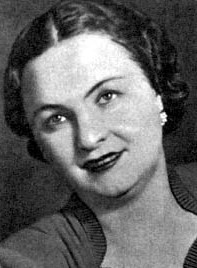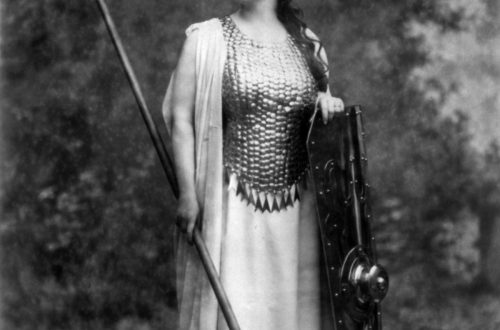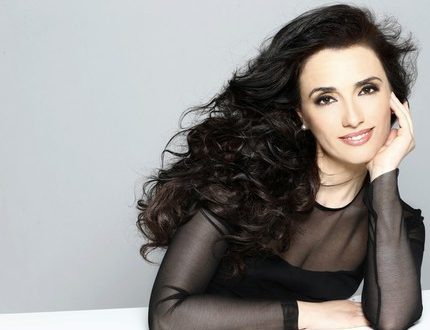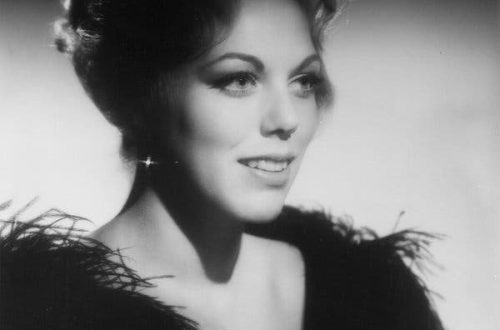
Veronika Ivanovna Borisenko |
Veronika Borisenko

The singer’s voice is well known to opera lovers of the older and middle generations. Veronika Ivanovna’s recordings were often reissued on phonograph records (a number of recordings are now reissued on CD), heard on the radio, in concerts.
Vera Ivanovna was born in 1918 in Belarus, in the village of Bolshiye Nemki, Vetka district. The daughter of a railway worker and a Belarusian weaver, at first she did not dream of becoming a singer. True, she was drawn to the stage and, after graduating from the seven-year period, Veronika enters the theater of working youth in Gomel. During the rehearsals of the choir, who were learning mass songs for the October holidays, her bright low voice easily blocked the sound of the choir. The head of the choir, the director of the Gomel Musical College, draws attention to the girl’s outstanding vocal abilities, who insisted that Vera Ivanovna learn to sing. It was within the walls of this educational institution that the musical education of the future singer began.
The feeling of gratitude and love for her first teacher, Vera Valentinovna Zaitseva, Veronika Ivanovna carried through her whole life. “During the first year of study, I was not allowed to sing anything except exercises that I repeated an infinite number of times,” Veronika Ivanovna said. – And only in order to at least somewhat disperse and switch, Vera Valentinovna allowed me to sing Dargomyzhsky’s romance “I’m sad” in the first year of classes. I owe my first and favorite teacher the ability to work on myself.” Then Veronika Ivanovna enters the Belarusian State Conservatory in Minsk, devoting herself entirely to singing, which by that time had finally become her vocation. The Great Patriotic War interrupted these classes, and Borisenko was part of the concert teams and went to the front to perform there in front of our soldiers. Then she was sent to finish her studies in Sverdlovsk at the Ural Conservatory named after M. P. Mussorgsky. Veronika Ivanovna begins performing on the stage of the Sverdlovsk Opera and Ballet Theatre. She makes her debut as Ganna in “May Night”, and the attention of the listeners is attracted not only by the vast range, but also, in particular, by the beautiful timbre of her voice. Gradually, the young singer began to gain stage experience. In 1944, Borisenko moved to the Kyiv Opera and Ballet Theatre, and in December 1946 she was admitted to the Bolshoi Theater, where she worked with a short break of three years until 1977, on the stage of which she successfully sang the parts of Ganna (“May Night” ), Polina (“The Queen of Spades”), Lyubasha “The Tsar’s Bride”), Gruni (“Enemy Force”). Especially Vera Ivanovna at the initial stage of performances at the Bolshoi was successful in the part and image of Konchakovna in Prince Igor, which required especially hard work from the actress. In one of the letters, A.P. Borodin indicated that he was “drawn to singing, cantilena.” This aspiration of the great composer was vividly and peculiarly manifested in Konchakovna’s famous cavatina. Belonging to the best pages of world opera, this cavatina is remarkable for its amazing beauty and flexibility of ornamental melody. Borisenko’s performance (the record has been preserved) is evidence not only of the completeness of vocal mastery, but also of the subtle sense of style inherent in the singer.
According to the memoirs of her colleagues, Veronika Ivanovna worked with great enthusiasm on other characters in Russian classical opera. Her Love in “Mazepa” is full of energy, a thirst for action, this is Kochubey’s true inspiration. The actress also worked hard on creating solid and vivid images of Spring-Red in The Snow Maiden and Grunya in A. Serov’s opera Enemy Force, which was then on the stage of the Bolshoi Theater. Veronika Ivanovna also fell in love with the image of Lyubava, she said this about her work in Sadko: “Every day I begin to love and understand the charming image of Lyubava Buslaevna, the wife of the Novgorod gusler Sadko, more and more. Meek, loving, suffering, she reflects in herself all the features of a sincere and simple, gentle and faithful Russian woman.
The repertoire of V. I. Borisenko also included parts from the Western European repertoire. Her work in “Aida” (the party of Amneris) was especially noted. The singer skillfully showed the various aspects of this complex image – the arrogant lust for power of the proud princess and the drama of her personal experiences. Veronika Ivanovna paid much attention to the chamber repertoire. She often performed romances by Glinka and Dargomyzhsky, Tchaikovsky and Rachmaninov, works by Handel, Weber, Liszt and Massenet.
Discography of V. I. Borisenko:
- J. Bizet “Carmen” – the part of Carmen, the second Soviet recording of the opera in 1953, the choir and orchestra of the Bolshoi Theater, conductor V. V. Nebolsin (partners – G. Nelepp, E. Shumskaya, Al. Ivanov and others). (Currently, the recording has been released by the domestic firm “Quadro” on CD).
- A. Borodin “Prince Igor” – part of Konchakovna, the second Soviet recording of the opera in 1949, choir and orchestra of the Bolshoi Theater, conductor – A. Sh. Melik-Pashaev (partners – An. Ivanov, E. Smolenskaya, S. Lemeshev, A. Pirogov , M. Reizen and others). (Last reissued by Melodiya on phonograph records in 1981)
- J. Verdi “Rigoletto” – part Maddalena, recorded in 1947, choir GABT, orchestra VR, conductor S. A. Samosud (partner — An. Ivanov, I. Kozlovsky, I. Maslennikova, V. Gavryushov, etc.). (Currently released on CD overseas)
- A. Dargomyzhsky “Mermaid” – part of the Princess, recorded in 1958, choir and orchestra of the Bolshoi Theater, conductor E. Svetlanov (partners – Al. Krivchenya, E. Smolenskaya, I. Kozlovsky, M. Miglau and others). (Last release – “Melody”, mid-80s on gramophone records)
- M. Mussorgsky “Boris Godunov” – part of Schinkarka, recorded in 1962, choir and orchestra of the Bolshoi Theater, conductor A. Sh. Melik-Pashaev (partners – I. Petrov, G. Shulpin, M. Reshetin, V. Ivanovsky, I. Arkhipova , E. Kibkalo, Al. Ivanov and others). (Currently released on CD overseas)
- N. Rimsky-Korsakov “May Night” – part of Ganna, recorded in 1948, choir and orchestra of the Bolshoi Theater, conductor V. V. Nebolsin (partners – S. Lemeshev, S. Krasovsky, I. Maslennikova, E. Verbitskaya, P. Volovov and etc.). (Released on CD overseas)
- N. Rimsky-Korsakov “The Snow Maiden” – part of Spring, recorded in 1957, choir and orchestra of the Bolshoi Theater, conductor E. Svetlanov (partners – V. Firsova, G. Vishnevskaya, Al. Krivchenya, L. Avdeeva, Yu. Galkin and others. ). (Domestic and foreign CDs)
- P. Tchaikovsky “The Queen of Spades” – part of Polina, third Soviet recording of 1948, choir and orchestra of the Bolshoi Theater, conductor A. Sh. Melik-Pashaev (partners – G. Nelepp, E. Smolenskaya, P. Lisitsian, E. Verbitskaya, Al Ivanov and others). (Domestic and foreign CDs)
- P. Tchaikovsky “The Enchantress” – part of the Princess, recorded in 1955, VR choir and orchestra, joint recording of soloists of the Bolshoi Theater and VR, conductor S. A. Samosud (partners – N. Sokolova, G. Nelepp, M. Kiselev, A. Korolev , P. Pontryagin and others). (The last time it was released on gramophone records “Melodiya” in the late 70s)





